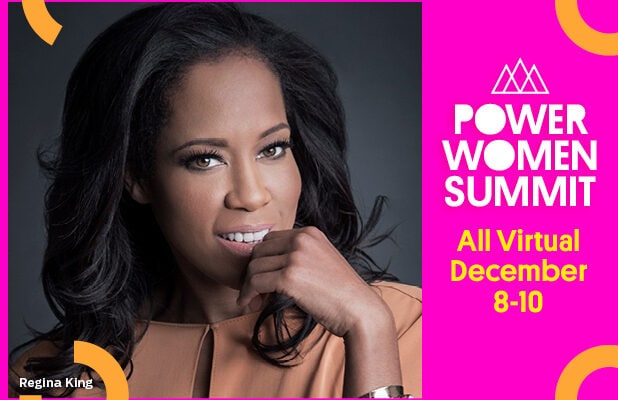*Today, during Day 2 Main Stage programming at WrapWomen’s Power Women Summit 2020 in Los Angeles, the largest annual gathering of the most influential women in entertainment, media and technology, Regina King opens up about her upcoming directorial debut “One Night In Miami,” finding vulnerability in four iconic Black men, hiring as many women as possible behind the scenes, and how John Singleton helped her on the path to becoming a director.
Highlights from the conversation with Regina King include:
- On her upcoming directorial debut “One Night In Miami: “There were so many things about [the screenplay] that spoke to me just as a Black woman…getting to see Black men have a private discussion publicly and to see men so layered,” King said. “Kemp Powers’ dialogue is so unfortunately prescient. The conversations that are happening in this film are happening in 1960, in 1950 and they’re happening now. Then just as a director, I’ve been doing TV for a while…When I read this I felt that it was playing to my strengths. This is an actors piece and I’m an actor. And every single one of these roles I would want to play.”
- On finding vulnerability in four of the most iconic Black men of the 20th Century (in “One Night in Miami”): “There’s a certain amount of vulnerability that men have that all of these men show in this piece,” King said. “I feel like I was sensitive to it. I saw it immediately. I understood Kemp’s desire and vision to depict Black men the way he sees himself, in his likeness. I just felt like having that sensitivity made me the perfect candidate to direct.”
- On hiring as many women as possible behind the scenes for “One Night in Miami’ (as she vowed in her 2019 Golden Globe acceptance speech to ensure that “everything I produce is 50% women”): “Yes, we absolutely did…As I said in the speech it was going to be a difficult task…What we were able to accomplish was great numbers when it comes to diversity or comes to what reflects the world that we’re in. And I believe we were at like 70, 74, 75, 76, something like that, percent of our entire crew was of color, identified as LGBTQ or women. So we did, in our attempt to accomplish the gender parity, we were able to go beyond with diversity.”
- On how Director John Singleton helped her on the path to becoming a director: “Once I got that role, John really opened up his whole process for me as a director,” she recalled. “And that’s when I really started getting a clearer understanding of what a director does, because my experience up until that point was just the relationship between a director and an actor. And while I wasn’t consciously realizing in that moment that one day I will direct, I think the seed was planted and he was starting to water it.”
You can view the full conversation here or directly below:
Additionally, highlights from the conversation with Abigail Disney include:
- On how her Grandfather’s company was completely unprepared for the pandemic: “We were not in a position to handle the emergency well…You keep cash on hand for an emergency; that’s what is for. You can’t predict a pandemic, but you can predict an emergency will happen.”
- On Disney’s reorganizing, restructuring and massive revenue and job losses and why it didn’t have to be this way: “If they had been less motivated by simply pushing profits to shareholders, but rather to stakeholders, their employees wouldn’t have had to run to food banks quite as quickly…They might have had the savings to support themselves on and Disney might have had some cash on hand, instead of having to borrow immediately for their needs…So it’s the grasping after profits has left the structures of our society hollowed out.”
- On how the company’s prioritizing of its shareholders above all else has left it in its current weakened state: ““What if we conducted our businesses as though all human beings had equal dignity in them and if actually if we brought that to our boardrooms and to our business plans and to our C-suites, I think a lot of things would inherently change. So Disney was, before the pandemic, historically profitable, amazingly profitable, extraordinary. And Bob Iger had been an extraordinary manager. He managed the company brilliantly through kind of a transition into the 21st century. So I have no beef with him on the way he’s run the company for profit…But I do know that he ran the company with an eye toward share price, and maybe not a lot other than that. He ran the company, making tons and tons and tons of share buybacks, paying out a lot of dividends, when there was an opportunity when they were that profitable to really think about, like, maybe the money should be flooding more widely out across the employment structure.”
You can view the full interview here.
Additionally, during the Redefining Corporate Culture panel, top female executive including Dalana Brand (VP People Experience, Head of Inclusion & Diversity, Twitter), Christy Haubegger (EVP & Chief Enterprise Inclusion Officer, WarnerMedia), Dalila Wilson-Scott (EVP & Chief Diversity Officer, Comcast Corporation), Christine Simmons (COO, The Academy of Motion Picture Arts and Sciences), discussed moving businesses beyond bad habits.
- Christine Simmons: “Just as important as it is to put on [the Academy Awards], it’s just as important that there’s representation…It’s a business imperative.”
- Christy Haubegger: “The reckoning that we need to have in this country about where we came from and what we were built on and all of those assumptions is overdue…While it may seem like the worst of times, until we confront that, I don’t think we get to move forward. And so I actually feel like this is a good moment…Each of our companies is so massive. We are a small piece of society itself…And if we all decide that we’re going to actually change the way we operate, that we’re going to make things more equitable in the reality that we control, which is our workplace, then we can actually begin to move towards a more equitable and just society.”
You can view the full panel here.
You can view additional Day 2 Main Stage programming including Coffee & Conversation with Camila Alves McConaughey, and the Trans Representation in Media & Tech panel with Angelica Ross and Imara Jones here. Please link back/source all coverage to WrapWomen’s Power Women Summit.
We Publish News 24/7. Don’t Miss A Story. Click HERE to SUBSCRIBE to Our Newsletter Now!






